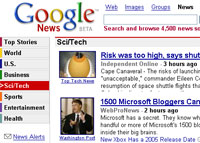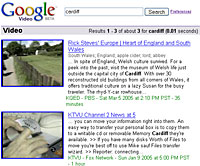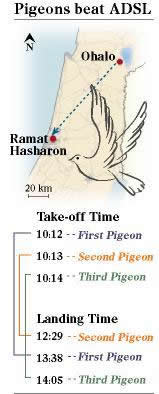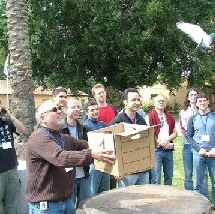 According to a survey carried out over the Easter period by network management company, Ipswitch, a thumping 93% of all e-mail received was unwanted spam.
According to a survey carried out over the Easter period by network management company, Ipswitch, a thumping 93% of all e-mail received was unwanted spam.
A new beast of a virus is on the loose, with anti virus firm Sophos claiming that the Sober.P worm has “broken records in terms of the number of infected messages sent out and speed of propagation throughout Western European segments of the Internet.”
The UK security company reported that the Sober.P virus, first detected on Monday, now accounts for 77 percent of all viruses detected by their threat-monitoring stations worldwide.
“This is a pretty significant virus. We usually don’t see it spread to 77 percent of all inbound viruses,” warned Gregg Mastoras, a senior security analyst at Sophos.
“Usually, it spreads much slower, and users have time to update their computers,” he added.
Variants of Sober have been around since 2003, with the mass-mailing worm continuing to spread as crazy mad fools still open attachments in infected email.
The latest version, variously tagged Sober.N, Sober.O or Sober.S, uses email written in both English and German with one variant luring victims with a message saying the recipient has won free tickets to the 2006 World Cup in Germany.
Once the infected attachment is opened, the virus copies itself onto the host computer, scoops up email addresses from the user’s machine and then blasts out similar infected emails to the harvested addresses.
Graham Cluley, senior technology consultant for Sophos, thinks the World Cup message is aiding the rapid spread of the virus: “Many people will be eager to attend one of the biggest sporting events in the world next year, and may think it’s worth the risk of opening the email attachment just in case the prize is for real.”
Showing a Tommy Cooper-esque flair for comedy, Cluley added, “Computer users who don’t practice safe computing will feel as sick as a parrot, and will only be passing this worm onto other unsuspecting victims.”
Sober.P may end 2005 as one of the worst viruses, replacing last year’s bad boy, Netsky.P, which accounted for 22.6 percent of all virus incidents, according to Sophos.
 According to a survey carried out over the Easter period by network management company, Ipswitch, a thumping 93% of all e-mail received was unwanted spam.
According to a survey carried out over the Easter period by network management company, Ipswitch, a thumping 93% of all e-mail received was unwanted spam. Google is busily hatching plans to dramatically improve the results of internet news searches by introducing a system that ranks articles by quality rather than just their date and relevance to search terms.
Google is busily hatching plans to dramatically improve the results of internet news searches by introducing a system that ranks articles by quality rather than just their date and relevance to search terms. Yahoo has announced plans to ramp up the feature set of its
Yahoo has announced plans to ramp up the feature set of its  The service currently only allows users to include content from other Yahoo services such as Yahoo Photos and Yahoo Music, but now Yahoo are to offer the inclusion of RSS (Really Simple Syndication) feeds from other sources.
The service currently only allows users to include content from other Yahoo services such as Yahoo Photos and Yahoo Music, but now Yahoo are to offer the inclusion of RSS (Really Simple Syndication) feeds from other sources. Like a hungry, hyperactive terrier, Firefox continues to take great chunks out of Microsoft’s market share as the Mozilla Foundation announces its 50 millionth download.
Like a hungry, hyperactive terrier, Firefox continues to take great chunks out of Microsoft’s market share as the Mozilla Foundation announces its 50 millionth download. Fully released last November, Firefox has delivered a turbo-charged size nine up the backside of the Web browser market which seemed to be heading for stagnant domination by Microsoft’s ubiquitous Internet Explorer.
Fully released last November, Firefox has delivered a turbo-charged size nine up the backside of the Web browser market which seemed to be heading for stagnant domination by Microsoft’s ubiquitous Internet Explorer. Google continues to sink its teeth into the potentially lucrative TV search business, with the announcement that it has added 14 new channels to its Google Video service.
Google continues to sink its teeth into the potentially lucrative TV search business, with the announcement that it has added 14 new channels to its Google Video service. Due to unsettled licensing terms, Google cannot provide full transcripts or video clips, although their website teasingly suggests that we “stay tuned” for news.
Due to unsettled licensing terms, Google cannot provide full transcripts or video clips, although their website teasingly suggests that we “stay tuned” for news. Development of the TV indexing service is being developed at the same time as Google’s new
Development of the TV indexing service is being developed at the same time as Google’s new  This has Friday Story written all over it. A few Israeli geeks set up a test to compare the speed of delivering data via pigeon (PEI – Pigeon Enabled Internet, as they’ve labelled it) compared with ADSL.
This has Friday Story written all over it. A few Israeli geeks set up a test to compare the speed of delivering data via pigeon (PEI – Pigeon Enabled Internet, as they’ve labelled it) compared with ADSL. As you know, the A in ADSL stands for Asynchronous, so the transferred rates listed equate to the speed that information is received. Upload rates are significantly lower. By their calculations, uploading 4Gb of data on ADSL would take around 96 hours – making the pigeon transfer significantly more efficient, equivalent to a T1 connection at 1.5Mbps.
As you know, the A in ADSL stands for Asynchronous, so the transferred rates listed equate to the speed that information is received. Upload rates are significantly lower. By their calculations, uploading 4Gb of data on ADSL would take around 96 hours – making the pigeon transfer significantly more efficient, equivalent to a T1 connection at 1.5Mbps. Chat around the office lead us to wonder what the next in the endless list of variation on creatures being used to transfer information would be. Nicolas Nova has provided the answer –
Chat around the office lead us to wonder what the next in the endless list of variation on creatures being used to transfer information would be. Nicolas Nova has provided the answer –  Sony have produced a portable games console which on its own merit is going to sell a lot of units. However it has the possibility of becoming a portable media hub that will give even Microsoft a jolt by driving into their Portable Media Center market.
Sony have produced a portable games console which on its own merit is going to sell a lot of units. However it has the possibility of becoming a portable media hub that will give even Microsoft a jolt by driving into their Portable Media Center market. The system uses Sony’s 1.8″ UMD optical disk which comes in a protective sheath (like a minidisc). They’re small enough so you could easily carry a few around with you (though don’t eject them unless there’s something solid and accessible beneath you as they have a tendency to fly out and disappear somewhere awkward). There’s also a Memory Stick due (32MB supplied) to allow game saves and other features.
The system uses Sony’s 1.8″ UMD optical disk which comes in a protective sheath (like a minidisc). They’re small enough so you could easily carry a few around with you (though don’t eject them unless there’s something solid and accessible beneath you as they have a tendency to fly out and disappear somewhere awkward). There’s also a Memory Stick due (32MB supplied) to allow game saves and other features. The system looks like a USB memory device when attached to a PC (which basically gives access to the Memory Stick) and you can store audio and video on it. Sensibly, Sony support MP3 directly on the PSP, though it will also support ATRACplus encoded music. Interestingly, if someone decides to produce UMD music disks, they only support ATRACplus and linear PCM). Video is H.264/MPEG-4 AVC on the UMD and MPEG-4 SP, AAC on the memory stick.
The system looks like a USB memory device when attached to a PC (which basically gives access to the Memory Stick) and you can store audio and video on it. Sensibly, Sony support MP3 directly on the PSP, though it will also support ATRACplus encoded music. Interestingly, if someone decides to produce UMD music disks, they only support ATRACplus and linear PCM). Video is H.264/MPEG-4 AVC on the UMD and MPEG-4 SP, AAC on the memory stick. Once the PSP has real Internet capability it will be a media powerhouse, the screen size is about right for watching movies on the go. You could do this now by converting a current MPEG-2 (DVD) to MPEG-4 and storing it on the memory stick (ignoring all legal ramifications), but in future it’s more than likely you’ll be able to stream movies (or audio) directly to the unit. Sony as a music publisher and movie house, is likely to want to sell its content to a market of portable viewers – it owns both ends of the stick.
Once the PSP has real Internet capability it will be a media powerhouse, the screen size is about right for watching movies on the go. You could do this now by converting a current MPEG-2 (DVD) to MPEG-4 and storing it on the memory stick (ignoring all legal ramifications), but in future it’s more than likely you’ll be able to stream movies (or audio) directly to the unit. Sony as a music publisher and movie house, is likely to want to sell its content to a market of portable viewers – it owns both ends of the stick. The battle between Google and Yahoo continues to heat up, with Yahoo ramping up the feature set of its ‘My Web’ suite of personal search tools.
The battle between Google and Yahoo continues to heat up, with Yahoo ramping up the feature set of its ‘My Web’ suite of personal search tools. Yahoo claim that their service is “better than bookmarks”, with users able to save an exact copy of a page along with the link, so that saved content will always be there when users return to the page.
Yahoo claim that their service is “better than bookmarks”, with users able to save an exact copy of a page along with the link, so that saved content will always be there when users return to the page. Yahoo’s search history tool bears more than a passing similarity to the one released by Google last week and reflects the fierce competition between the two companies.
Yahoo’s search history tool bears more than a passing similarity to the one released by Google last week and reflects the fierce competition between the two companies. BT Rich Media has cuddled up to Sportfive, a French sports marketing group, and announced a partnership to make 2006 Football World Cup qualifying and friendly games available to fans streamed over broadband on the Internet.
BT Rich Media has cuddled up to Sportfive, a French sports marketing group, and announced a partnership to make 2006 Football World Cup qualifying and friendly games available to fans streamed over broadband on the Internet. Football bonkers viewers will be able to choose between 250Kbps or 500Kbps quality streams for approximately £7 (~US$13 ~€10), or alternatively download the entire match to keep forever for around £5 (~US$9.50 ~€7). As a long suffering Wales fan, I have to admit that there’s several games which I never wish to see again!
Football bonkers viewers will be able to choose between 250Kbps or 500Kbps quality streams for approximately £7 (~US$13 ~€10), or alternatively download the entire match to keep forever for around £5 (~US$9.50 ~€7). As a long suffering Wales fan, I have to admit that there’s several games which I never wish to see again! The games will be served up on http://www.qualifiers2006.com and promoted to over 10 million users via a range of affiliate sites such as soccernet.com,.teamtalk.com, sportinglife.com and rivals.net .
The games will be served up on http://www.qualifiers2006.com and promoted to over 10 million users via a range of affiliate sites such as soccernet.com,.teamtalk.com, sportinglife.com and rivals.net .